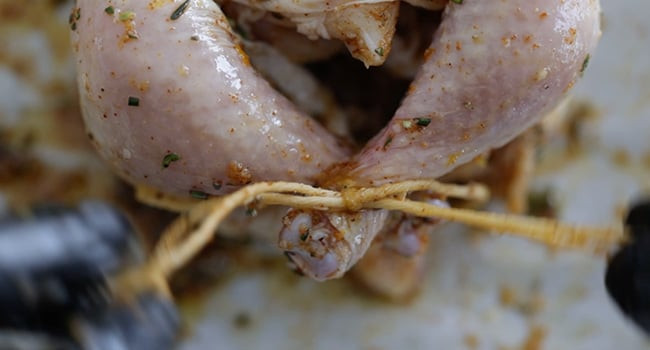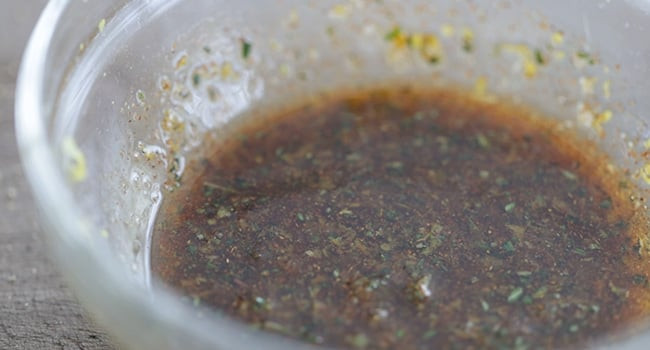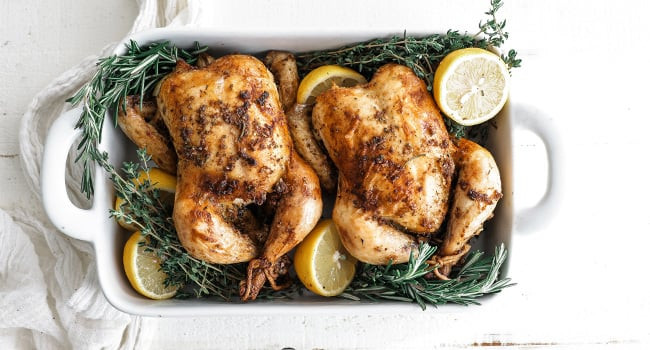Cornish Game Hens How To Cook perfectly? You’ve come to the right place. At polarservicecenter.net, we understand the importance of not just tracking your fitness goals with your Polar device, but also fueling your body with delicious and healthy meals. This guide provides a comprehensive walkthrough on how to cook cornish game hens, ensuring a flavorful and satisfying dining experience every time. From preparation to serving suggestions, we cover everything you need to know. Whether you’re a seasoned chef or just starting out, this guide will help you master the art of cooking these delectable birds. This resource is crafted to ensure you can create memorable meals while staying active and healthy. Dive in to discover all the tips and tricks for cooking juicy and flavorful cornish game hens.
1. What Exactly Are Cornish Game Hens?
Cornish game hens are young, small chickens, usually a cross between a Cornish and White Plymouth Rock chicken. They are typically 4 to 6 weeks old and weigh between 1 and 2.5 pounds, making them a perfect single serving.
1.1 What Makes Cornish Game Hens Unique?
Cornish game hens offer a unique combination of convenience and flavor. Their small size makes them ideal for individual servings, while their tender meat and mild flavor profile make them incredibly versatile for various cooking methods and flavor combinations. According to the USDA, Cornish game hens must weigh no more than 2.5 pounds.
1.2 Why Choose Cornish Game Hens?
- Portion Control: Ideal for individual servings, helping with portion management.
- Quick Cooking Time: Shorter cooking time compared to larger poultry.
- Versatile Flavor: Mild flavor that pairs well with various herbs and spices.
- Elegant Presentation: Their small size makes them perfect for elegant dinner presentations.
2. Preparing Your Cornish Game Hens for Cooking
Proper preparation is key to achieving the best results when cooking Cornish game hens. This involves thawing, cleaning, and seasoning the hens to ensure they are flavorful and ready for cooking.
2.1 Thawing Cornish Game Hens Safely
- Refrigerator Thawing: The safest method is to thaw the hens in the refrigerator. This can take 24-48 hours, depending on their size.
- Cold Water Thawing: If you need to thaw them more quickly, place the hens in a leak-proof bag and submerge them in cold water, changing the water every 30 minutes. This should take about 1-3 hours.
- Microwave Thawing: While faster, microwave thawing can lead to uneven cooking. If using this method, cook the hens immediately after thawing.
2.2 Cleaning and Trimming the Hens
- Rinse: Rinse the hens under cold running water to remove any debris.
- Pat Dry: Pat the hens dry with paper towels. This helps the skin crisp up during cooking.
- Remove Giblets: Check the cavity for any giblets and remove them.
- Trim Excess Fat: Trim any excess fat around the cavity opening and neck area.
2.3 Seasoning Techniques for Cornish Game Hens
- Dry Rubs: A blend of herbs, spices, and salt can be rubbed all over the hens, inside and out.
- Marinades: Soaking the hens in a marinade for several hours can infuse them with flavor and help keep them moist during cooking.
- Herb Butter: Smearing herb-infused butter under the skin can add richness and flavor.
- Brining: Soaking the hens in a saltwater solution can help them retain moisture and enhance their flavor. According to a study by the National Chicken Council, brining can improve the tenderness of poultry.
3. Essential Cooking Methods for Cornish Game Hens
Cornish game hens can be cooked using various methods, each offering unique flavors and textures. Here are some essential cooking methods:
3.1 Roasting Cornish Game Hens
Roasting is a classic method that yields juicy, flavorful hens with crispy skin.
- Preheat Oven: Preheat your oven to 425°F (220°C).
- Prepare Hens: Season the hens with your choice of dry rub, marinade, or herb butter.
- Truss the Hens: Truss the hens by tying the legs together with kitchen twine. This helps them cook evenly.
 Trussed Cornish Hens
Trussed Cornish Hens
Alt text: Trussed cornish hens tied with butcher’s twine, ready for roasting.
- Place on Rack: Place the hens on a roasting rack in a roasting pan.
- Roast: Roast for 50-60 minutes, or until the internal temperature reaches 165°F (74°C) in the thickest part of the thigh. Use a meat thermometer to ensure accuracy.
- Rest: Let the hens rest for 10 minutes before carving and serving.
3.2 Grilling Cornish Game Hens
Grilling adds a smoky flavor to the hens, making them perfect for summer barbecues.
- Prepare Grill: Preheat your grill to medium heat.
- Prepare Hens: Season the hens with your choice of dry rub or marinade.
- Grill: Place the hens on the grill, breast side up. Grill for 20-25 minutes, then flip and grill for another 15-20 minutes, or until the internal temperature reaches 165°F (74°C).
- Basting: Baste the hens with your favorite barbecue sauce during the last 10 minutes of grilling for added flavor.
- Rest: Let the hens rest for 10 minutes before carving and serving.
3.3 Pan-Searing Cornish Game Hens
Pan-searing is a quick and easy method that results in crispy skin and juicy meat.
- Prepare Hens: Season the hens with salt, pepper, and any other desired spices.
- Heat Pan: Heat a large skillet over medium-high heat with 1-2 tablespoons of oil.
- Sear: Place the hens in the hot pan, breast side down. Sear for 5-7 minutes, or until the skin is golden brown and crispy.
- Flip and Cook: Flip the hens and cook for another 15-20 minutes, or until the internal temperature reaches 165°F (74°C).
- Rest: Let the hens rest for 10 minutes before serving.
3.4 Slow Cooking Cornish Game Hens
Slow cooking results in incredibly tender and flavorful hens, perfect for busy weeknights.
- Prepare Hens: Season the hens with your choice of dry rub or marinade.
- Place in Slow Cooker: Place the hens in a slow cooker.
- Add Liquid: Add about 1 cup of chicken broth or other liquid to the slow cooker to keep the hens moist.
- Cook: Cook on low for 6-8 hours, or on high for 3-4 hours, until the meat is very tender.
- Shred or Serve: Shred the meat and serve it over rice, pasta, or in sandwiches.
4. Flavor Enhancements: Recipes and Seasoning Ideas
Enhancing the flavor of Cornish game hens is an art. Here are several recipes and seasoning ideas to elevate your cooking:
4.1 Classic Herb Roasted Cornish Game Hens
This simple recipe highlights the natural flavors of the hens with a blend of classic herbs.
Ingredients:
- 2 Cornish game hens
- 2 tablespoons olive oil
- 2 cloves garlic, minced
- 1 tablespoon fresh rosemary, chopped
- 1 tablespoon fresh thyme, chopped
- 1 teaspoon salt
- ½ teaspoon black pepper
Instructions:
- Preheat oven to 425°F (220°C).
- In a bowl, mix together olive oil, garlic, rosemary, thyme, salt, and pepper.
 Oil and herbs mixed in bowl
Oil and herbs mixed in bowl
Alt text: Olive oil, garlic, rosemary, and thyme mixed in a bowl, ready for seasoning cornish hens.
- Rub the herb mixture all over the hens, inside and out.
- Place the hens on a roasting rack in a roasting pan.
- Roast for 50-60 minutes, or until the internal temperature reaches 165°F (74°C).
- Let the hens rest for 10 minutes before serving.
4.2 Lemon-Garlic Marinated Cornish Game Hens
This marinade adds a bright, zesty flavor to the hens, making them perfect for grilling or roasting.
Ingredients:
- 2 Cornish game hens
- ¼ cup olive oil
- 2 lemons, juiced and zested
- 4 cloves garlic, minced
- 1 tablespoon Dijon mustard
- 1 teaspoon salt
- ½ teaspoon black pepper
Instructions:
- In a bowl, whisk together olive oil, lemon juice, lemon zest, garlic, Dijon mustard, salt, and pepper.
- Place the hens in a resealable bag or container and pour the marinade over them.
- Marinate in the refrigerator for at least 2 hours, or up to overnight.
- Preheat grill or oven to 400°F (200°C).
- Grill or roast the hens until the internal temperature reaches 165°F (74°C).
- Let the hens rest for 10 minutes before serving.
4.3 Spiced Cornish Game Hens with Apricot Glaze
This recipe adds a touch of sweetness and spice to the hens, creating a complex and delicious flavor profile.
Ingredients:
- 2 Cornish game hens
- 2 tablespoons olive oil
- 1 teaspoon smoked paprika
- 1 teaspoon cumin
- 1 teaspoon coriander
- ½ teaspoon cayenne pepper
- 1 teaspoon salt
- ½ teaspoon black pepper
- ¼ cup apricot preserves
- 1 tablespoon apple cider vinegar
Instructions:
- Preheat oven to 400°F (200°C).
- In a bowl, mix together olive oil, smoked paprika, cumin, coriander, cayenne pepper, salt, and pepper.
- Rub the spice mixture all over the hens, inside and out.
- Place the hens on a roasting rack in a roasting pan.
- Roast for 40 minutes.
- In a small saucepan, heat apricot preserves and apple cider vinegar over low heat until melted and smooth.
- Brush the apricot glaze over the hens.
- Roast for another 10-15 minutes, or until the internal temperature reaches 165°F (74°C).
- Let the hens rest for 10 minutes before serving.
5. Ensuring Food Safety When Cooking Cornish Game Hens
Food safety is paramount when cooking poultry. Here are some essential tips to ensure your Cornish game hens are safe to eat:
5.1 Safe Thawing Practices
- Refrigerator Thawing: Always thaw hens in the refrigerator to prevent bacterial growth.
- Cold Water Thawing: If using cold water thawing, ensure the water is cold and changed every 30 minutes.
- Avoid Room Temperature Thawing: Never thaw hens at room temperature, as this can promote bacterial growth.
5.2 Cooking to the Correct Internal Temperature
- Use a Meat Thermometer: Always use a meat thermometer to ensure the hens reach an internal temperature of 165°F (74°C) in the thickest part of the thigh.
- Check Multiple Spots: Check the temperature in multiple spots to ensure even cooking.
5.3 Preventing Cross-Contamination
- Wash Hands and Surfaces: Wash your hands, cutting boards, and utensils thoroughly with soap and water after handling raw poultry.
- Use Separate Cutting Boards: Use separate cutting boards for raw poultry and other foods to prevent cross-contamination.
6. Serving Suggestions and Side Dish Pairings
Cornish game hens are versatile and can be paired with a variety of side dishes to create a complete and satisfying meal.
6.1 Classic Side Dishes
- Roasted Vegetables: Roasted vegetables such as potatoes, carrots, and Brussels sprouts make a hearty and flavorful side dish.
- Mashed Potatoes: Creamy mashed potatoes are a comforting and classic pairing.
- Green Beans Almondine: Green beans with toasted almonds add a touch of elegance to the meal.
 Roasted cornish hens with lemons
Roasted cornish hens with lemons
Alt text: Roasted cornish hens garnished with lemons, fresh rosemary, and thyme, served on a platter.
6.2 Creative Side Dish Ideas
- Quinoa Salad: A quinoa salad with roasted vegetables and a lemon vinaigrette adds a healthy and flavorful twist.
- Wild Rice Pilaf: Wild rice pilaf with dried cranberries and pecans is a festive and flavorful side dish.
- Asparagus with Hollandaise Sauce: Steamed asparagus with hollandaise sauce adds a touch of luxury to the meal.
6.3 Wine Pairings
- Roasted Hens: Pair with a light-bodied red wine such as Pinot Noir or a crisp white wine such as Sauvignon Blanc.
- Grilled Hens: Pair with a medium-bodied red wine such as Merlot or a rosé wine.
- Spiced Hens: Pair with a fruity red wine such as Zinfandel or a Gewürztraminer.
7. Troubleshooting Common Issues When Cooking Cornish Game Hens
Even with the best preparation, issues can arise when cooking Cornish game hens. Here are some common problems and how to solve them:
7.1 Dry Meat
- Brining: Brine the hens before cooking to help them retain moisture.
- Basting: Baste the hens with pan juices or melted butter during cooking to keep them moist.
- Cooking Temperature: Avoid overcooking the hens by using a meat thermometer and cooking to the correct internal temperature.
7.2 Uneven Cooking
- Trussing: Truss the hens to ensure they cook evenly.
- Oven Temperature: Ensure your oven temperature is accurate.
- Rotating: Rotate the hens during cooking to promote even browning.
7.3 Skin Not Crispy
- Patting Dry: Pat the hens dry before seasoning to help the skin crisp up.
- High Heat: Roast or grill the hens at a high temperature to promote crispy skin.
- Oil or Butter: Brush the hens with oil or melted butter before cooking to help the skin brown and crisp up.
8. Storing and Reheating Leftover Cornish Game Hens
Proper storage and reheating techniques can help you enjoy leftover Cornish game hens without sacrificing flavor or quality.
8.1 Storing Leftovers
- Cooling: Allow the hens to cool slightly before storing them in the refrigerator.
- Containers: Store the hens in airtight containers to prevent them from drying out.
- Refrigeration: Refrigerate the hens for up to 3-4 days.
- Freezing: Freeze the hens for up to 2-3 months. Wrap them tightly in plastic wrap and then in foil to prevent freezer burn.
8.2 Reheating Methods
- Oven: Preheat oven to 350°F (175°C). Place the hens in a baking dish with a little broth or water to keep them moist. Cover with foil and bake for 15-20 minutes, or until heated through.
- Microwave: Place the hens on a microwave-safe plate and cover with a damp paper towel. Microwave on medium power for 2-3 minutes, or until heated through.
- Skillet: Heat a skillet over medium heat with a little oil or butter. Place the hens in the skillet and cook for 5-7 minutes, or until heated through, flipping occasionally.
9. Health Benefits of Eating Cornish Game Hens
Cornish game hens offer several nutritional benefits, making them a healthy addition to your diet.
9.1 Nutritional Value
- Protein: Cornish game hens are a good source of protein, which is essential for building and repairing tissues.
- Vitamins: They are rich in B vitamins, which play a crucial role in energy production and nerve function.
- Minerals: They contain minerals such as iron, zinc, and phosphorus, which are important for various bodily functions.
9.2 Health Benefits
- Muscle Building: The high protein content supports muscle growth and repair, making it ideal for athletes and fitness enthusiasts.
- Energy Production: B vitamins help convert food into energy, keeping you energized throughout the day.
- Immune Support: Zinc and other minerals support a healthy immune system, helping you stay healthy and fight off infections.
10. Frequently Asked Questions About Cooking Cornish Game Hens
10.1 What is the difference between a Cornish hen and a chicken?
A Cornish hen is a young, immature chicken, typically 4 to 6 weeks old and weighing around 1 to 2.5 pounds. Regular chickens are older and larger.
10.2 How do I know when a Cornish hen is cooked through?
Use a meat thermometer to check the internal temperature. It should reach 165°F (74°C) in the thickest part of the thigh.
10.3 Can I stuff a Cornish hen?
Yes, you can stuff a Cornish hen. However, make sure the stuffing also reaches an internal temperature of 165°F (74°C) to ensure food safety.
10.4 How long does it take to thaw a Cornish hen?
Thawing in the refrigerator can take 24-48 hours. Cold water thawing can take 1-3 hours, changing the water every 30 minutes.
10.5 What are some good seasonings for Cornish hens?
Classic herbs like rosemary and thyme, lemon-garlic marinades, and spice rubs with smoked paprika and cumin are all excellent choices.
10.6 Can I cook Cornish hens from frozen?
It is not recommended to cook Cornish hens from frozen, as it can result in uneven cooking and increase the risk of foodborne illness.
10.7 How do I prevent Cornish hens from drying out?
Brining, basting, and avoiding overcooking are key to preventing Cornish hens from drying out.
10.8 What are some good side dishes to serve with Cornish hens?
Roasted vegetables, mashed potatoes, quinoa salad, and wild rice pilaf are all excellent choices.
10.9 Can I reheat leftover Cornish hens?
Yes, you can reheat leftover Cornish hens in the oven, microwave, or skillet. Make sure to add a little broth or water to keep them moist.
10.10 Are Cornish game hens healthy?
Yes, Cornish game hens are a good source of protein, vitamins, and minerals, making them a healthy addition to your diet.
Conclusion
Mastering cornish game hens how to cook is now within your reach. By following this comprehensive guide, you can create delicious and impressive meals for any occasion. Remember, polarservicecenter.net is here to support your healthy lifestyle, not only with our fitness products but also with valuable resources for nutrition and well-being. For further assistance with your Polar products, including troubleshooting, warranty information, and more, don’t hesitate to visit polarservicecenter.net. Our team is dedicated to ensuring you get the most out of your Polar devices, so you can continue to track your fitness goals and enjoy a balanced, healthy life. Whether you’re in Boulder or anywhere else in the USA, polarservicecenter.net is your reliable resource for all things Polar. Reach out today and let us help you optimize your Polar experience! Address: 2902 Bluff St, Boulder, CO 80301, United States. Phone: +1 (303) 492-7080. Website: polarservicecenter.net.